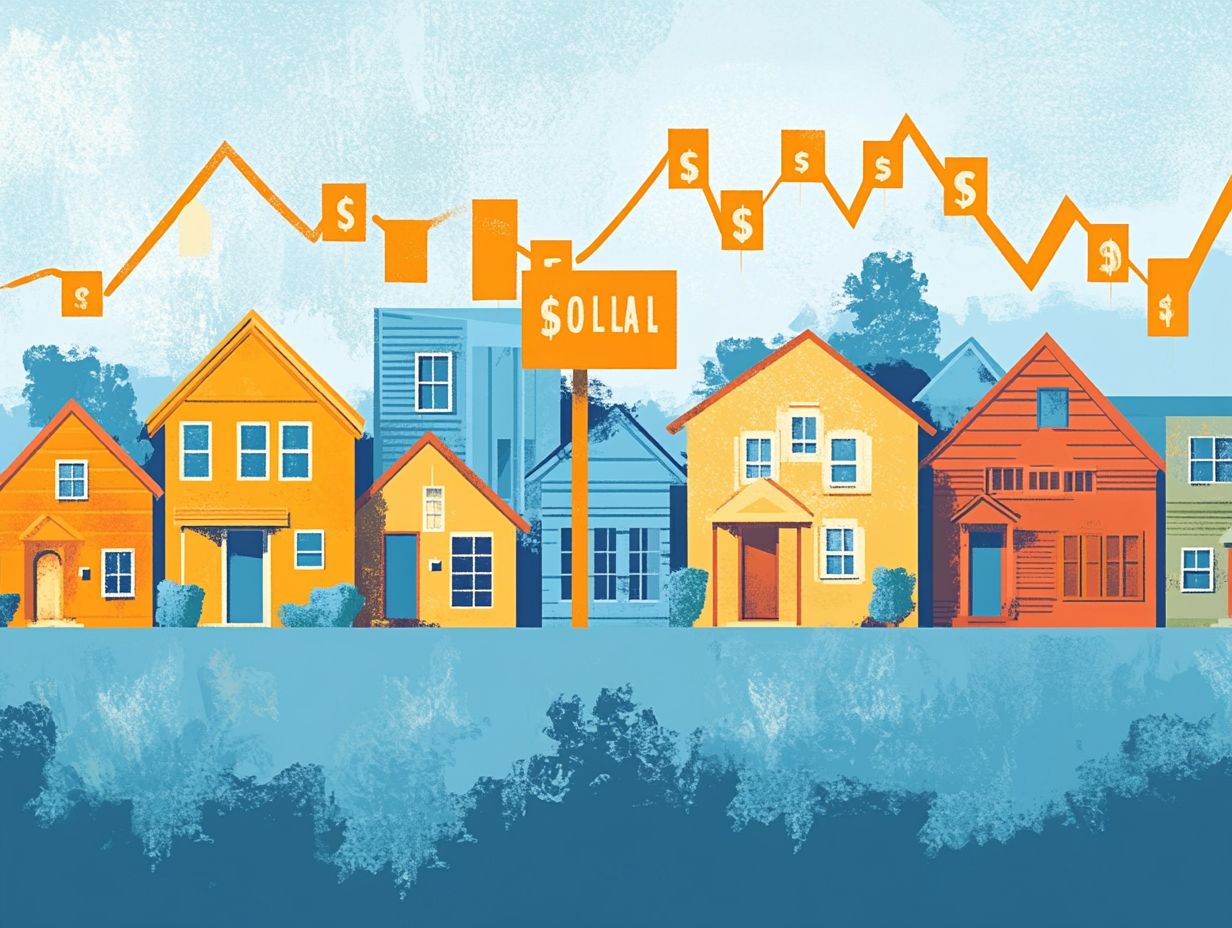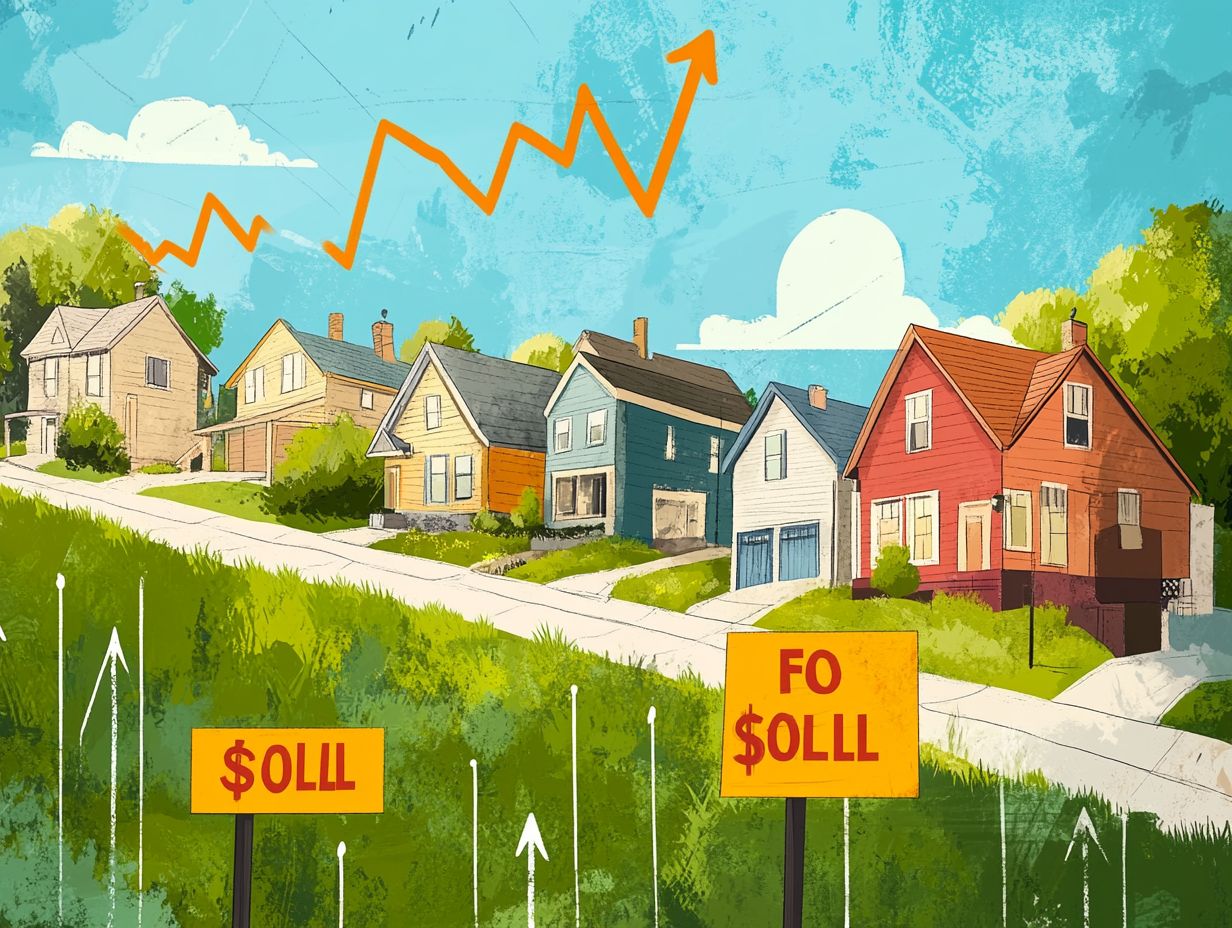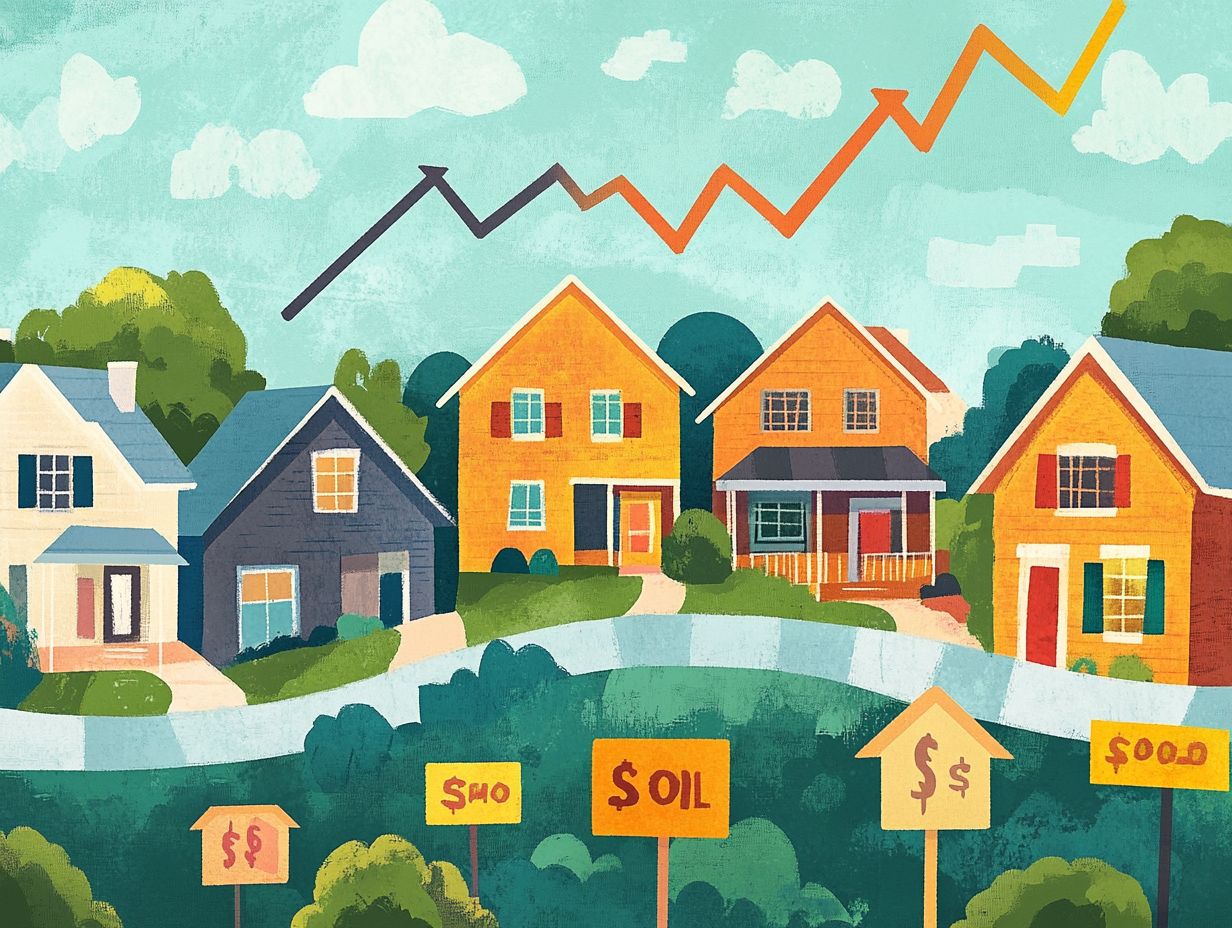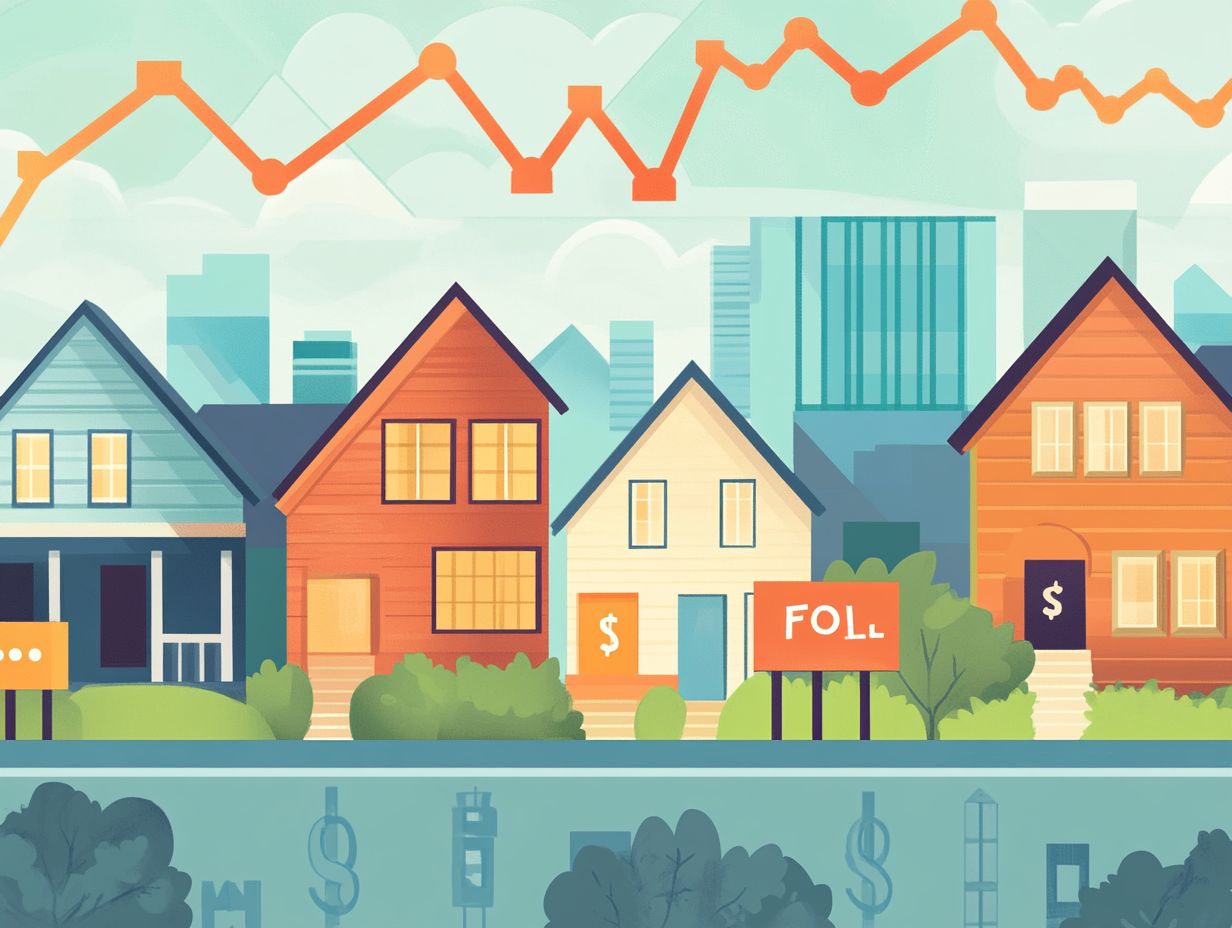What Drives Home Price Appreciation?
Understanding home price appreciation is crucial for anyone navigating the real estate market, whether you re a buyer, seller, or investor. This appreciation is influenced by many exciting factors.
This article delves into the various factors that influence home values, including economic statistics like interest rates and inflation, as well as the importance of location and neighborhood amenities.
You’ll discover how government policies and demographic shifts contribute to these dynamics, along with insights on predicting future trends. Join in as we unravel the complexities of home price appreciation, equipping you with the knowledge you need to make informed decisions.
Contents
- Key Takeaways:
- Understanding Home Price Appreciation
- Economic Factors Affecting Home Prices
- Location and Neighborhood Impact on Home Prices
- Other Influencing Factors on Home Prices
- Predicting Future Home Price Appreciation
- Frequently Asked Questions
- What Drives Home Price Appreciation?
- How Does Location Affect Home Price Appreciation?
- What role does supply and demand play in home price appreciation?
- How do economic conditions affect home price appreciation?
- Do interest rates play a role in home price appreciation?
- Is home price appreciation a guaranteed profit from your investment?
Key Takeaways:

Home price appreciation is the increase in value of a property over time, influenced by various economic factors such as interest rates, inflation, and housing market supply and demand. The location and neighborhood of a property also play a significant role in its appreciation, with desirable areas and amenities contributing to higher home prices.
Additionally, government policies, population, and demographic changes impact home prices. It is essential to consider these when predicting future appreciation based on expert opinions and market analysis.
Understanding Home Price Appreciation
Grasping the nuances of home price appreciation is crucial for potential buyers, investors, or policymakers.
This appreciation is shaped by a tapestry of interconnected factors, including demographic trends and government policies.
In the complex world of the housing market, shifts in interest rates can dramatically influence property demand. Insights from economic research like that from the Federal Reserve Bank offer valuable perspectives on how the homeownership rate correlates with market conditions.
By developing a deeper understanding of these elements, you sharpen your purchasing decisions and gain valuable context regarding the broader economic cycles that impact home values across the United States.
Economic Factors Affecting Home Prices
Economic factors are fundamental in shaping home prices. Interest rates and housing supply serve as key determinants that influence the broader housing market and property demand.
As the Federal Reserve adjusts interest rates in response to inflation and economic fluctuations, varying mortgage rates can dramatically impact your purchasing power.
Understanding how these economic indicators affect property values is crucial for both first-time homebuyers and seasoned investors navigating the complexities of the real estate landscape.
Interest Rates and Inflation
Interest rates and inflation are pivotal elements that directly impact the housing market. Changes in these economic indicators can lead to fluctuations in mortgage rates, ultimately affecting home prices.
When inflation rises, the Federal Reserve typically responds by increasing interest rates to stabilize the economy. This can deter potential buyers and dampen property demand. Historical events, such as the 2008 financial crisis, illustrate how plummeting interest rates were used strategically to rejuvenate the market, enabling home prices to recover gradually.
Conversely, when rates are low like after the COVID-19 pandemic demand surges, pushing home prices up and creating challenges for first-time buyers.
To successfully navigate these turbulent waters, consider the following strategies:
- Act now to explore fixed-rate mortgages to protect yourself from future interest hikes.
- Think about purchasing in less popular areas to maximize affordability.
- Strengthen your financial profile to secure more favorable lending terms.
Stay informed and adapt your strategy to navigate the housing market successfully!
Housing Market Supply and Demand
The dynamics of supply and demand in the housing market are crucial for understanding fluctuations in home prices. Current demographic trends are shifting, changing the demand for rental units and residential properties.
We re facing a growing housing shortage, worsened by factors like investor purchases and various government policies. You should analyze how these factors affect property prices across various regions in the United States.
As millennials and younger generations seek homes in urban centers, competition heats up due to dwindling inventory. Supply limitations from zoning laws, construction delays, and labor shortages create a mismatch between available homes and the needs of the population.
These market conditions affect not just homebuyers; they influence rental markets and local economies too. This affects everything from job growth to community stability.
Understanding these interconnected factors is vital for you as a stakeholder navigating today s housing landscape.
Location and Neighborhood Impact on Home Prices

Location and neighborhood characteristics greatly influence home prices. In desirable areas with amenities like parks, schools, and shopping centers, property values soar compared to less developed regions.
Research shows that movements of Baby Boomers and millennials shape demand in specific neighborhoods. This impacts market conditions and homeownership rates, guiding your real estate decisions.
Desirable Areas and Amenities
Desirable areas offer unique amenities that attract homebuyers. When you have access to quality schools and recreational facilities, demand tends to soar, driving up property values.
Take family-friendly neighborhoods in Plano, Texas. They often feature top-rated schools, leading to high demand for single-family homes and increasing prices.
Urban areas like downtown Seattle have a vibrant culture, complete with coffee shops and art galleries. These appeal to young professionals, raising the value of apartments and condos.
As a result, you may find yourself drawn to areas with these amenities. They enhance your lifestyle and promise solid returns on investment.
Neighborhood Development and Trends
Neighborhood development significantly affects property demand and home prices, especially in revitalized urban areas. Cities like Phoenix and regions in California show how population shifts and investment impact the housing market.
For instance, gentrification transforms lower-income areas into sought-after locales for young professionals. This surge in demand raises property values and reshapes communities.
Meanwhile, suburban expansion increases demand for single-family homes on larger lots. This appeals to those wanting to escape the fast-paced city life.
These trends pressure local economies and influence buyer behavior. As potential homeowners, weigh the long-term financial implications of your investments against ever-changing market dynamics.
Other Influencing Factors on Home Prices
Beyond economic factors, various elements impact home prices. Government policies, tax incentives, and demographic shifts intricately shape the housing market.
Initiatives supporting first-time homebuyers or tackling housing shortages can significantly affect property demand and homeownership rates in different regions.
Government Policies and Programs
Government policies and programs significantly shape the housing market. Tax incentives are designed to elevate homeownership rates among first-time buyers.
By offering financial assistance and favorable lending conditions, these initiatives stimulate property demand, ultimately influencing overall home prices.
Take, for example, the Federal Housing Administration (FHA) loan program. This program opens doors for borrowers with lower credit scores, making homeownership accessible!
On the state level, initiatives like down payment assistance grants are specifically tailored to address local needs. They effectively help to close affordability gaps.
These measures not only encourage individuals to invest in real estate but also spark increased activity in related sectors, such as construction and home improvement. Ultimately, this drives economic growth within communities.
Population and Demographic Changes

Population and demographic changes wield a profound influence over the housing market. Shifts in age, income, and family size can significantly alter homeownership rates and property demand.
Economic indicators serve as a revealing lens, illustrating how these trends impact home prices across various regions. As a real estate professional, it’s essential for you to remain vigilant and adaptable in the face of these fluctuations.
Younger generations prefer urban living and eco-friendly homes. This is changing what people expect from housing.
Meanwhile, an aging population is increasingly in search of accessible, single-level living options, adding further complexity to the demand landscape.
These demographic shifts often lead to regional pricing variances. Urban areas typically face heightened competition and, as a result, rising home values.
Today’s buyers place a premium on proximity to amenities, quality schools, and community aesthetics. All of these factors are rapidly influencing their purchasing decisions.
To navigate this evolving landscape effectively, you must understand these changing preferences. Aligning your strategies with market demands will optimize your approach and ensure success.
Predicting Future Home Price Appreciation
Understanding future home price appreciation is crucial for making smart real estate investments. It is a complex task that demands careful study of current market conditions, expert insights, and pertinent economic research.
As factors such as interest rates, housing supply, and demographic trends shift, grasping their intricate interactions helps you to make informed decisions about your real estate investments.
Expert Opinions and Market Analysis
Expert opinions and comprehensive market analysis are essential tools for you to understand future home prices and potential appreciation in the housing market.
By examining economic indicators and trends, industry professionals can offer valuable insights into the factors likely to influence property demand and market conditions. For instance, reputable sources like the National Association of Realtors illustrate how interest rates (the cost of borrowing money to buy a home), employment rates, and demographic shifts can significantly impact buyer behavior and housing supply.
A well-researched analysis from CoreLogic emphasizes that areas with robust job growth often witness accelerated home price increases. Such insights are invaluable for you, whether you re a buyer aiming to make informed decisions or a seller looking to optimize your listings.
Understanding these dynamics helps you anticipate market movements effectively, thereby enhancing your strategic planning in real estate investments.
Frequently Asked Questions
What Drives Home Price Appreciation?
Home price appreciation is driven by various factors such as location, supply and demand, economic conditions, and interest rates.
How Does Location Affect Home Price Appreciation?

Location is a key factor in driving home price appreciation. Homes in desirable areas with good schools, low crime rates, and easy access to amenities tend to appreciate faster than those in less desirable locations.
What role does supply and demand play in home price appreciation?
Supply and demand greatly impact home price appreciation. High demand with limited supply drives prices up.
How do economic conditions affect home price appreciation?
Economic factors, like job availability and rising prices, influence home price appreciation. Strong economic conditions usually create higher demand for homes.
Do interest rates play a role in home price appreciation?
Yes, interest rates affect home prices. Low rates make borrowing cheaper, increasing demand and driving prices up.
Is home price appreciation a guaranteed profit from your investment?
Home price appreciation can offer profit, but it s not guaranteed. Many factors can affect a home’s value, so always do your homework before diving in!






